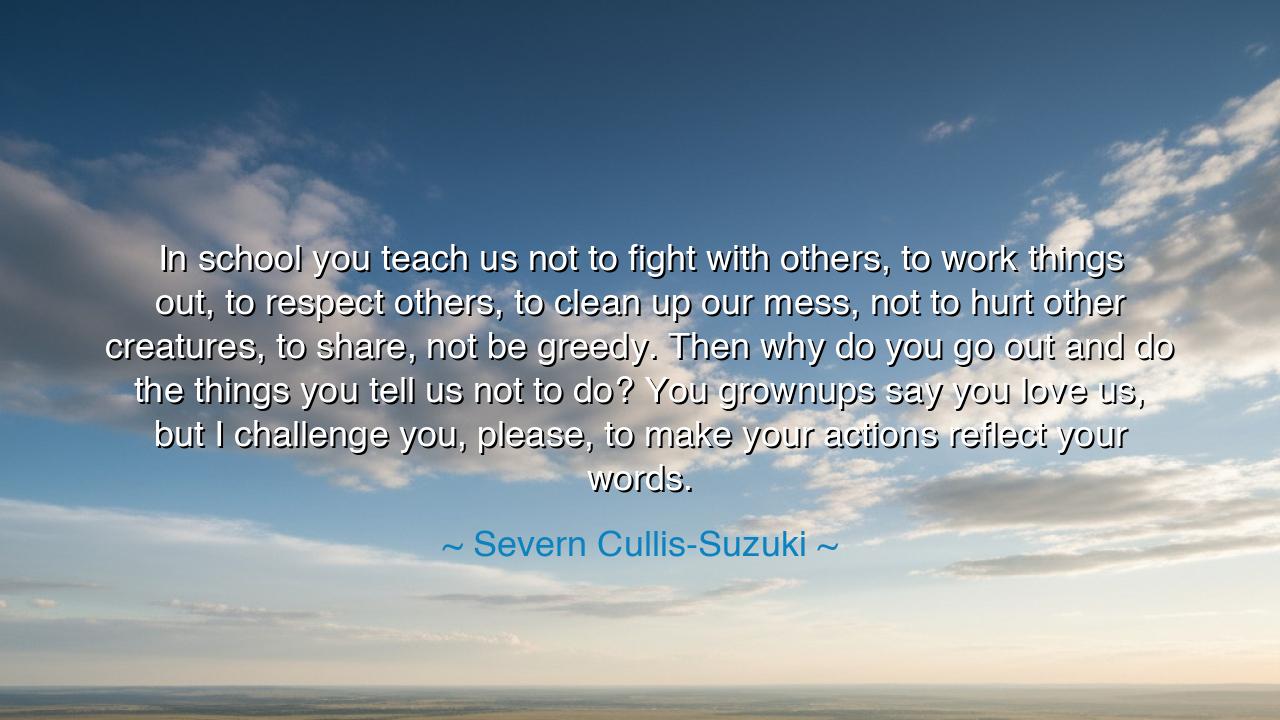
In school you teach us not to fight with others, to work things
In school you teach us not to fight with others, to work things out, to respect others, to clean up our mess, not to hurt other creatures, to share, not be greedy. Then why do you go out and do the things you tell us not to do? You grownups say you love us, but I challenge you, please, to make your actions reflect your words.






Listen well, for the words of Severn Cullis-Suzuki ring with the clarity of a bell across the centuries, a voice of truth emerging from youth to confront the illusions of age. She speaks of a world where children are taught the principles of justice, compassion, and restraint—to avoid fighting, to resolve conflicts peacefully, to respect others, to care for their surroundings, to show kindness to all creatures, and to share rather than hoard. Yet, she witnesses the dissonance between instruction and example, the chasm between what is preached and what is practiced. How can the young trust the wisdom of the elders when the elders themselves betray the values they espouse?
From the earliest days of human history, this paradox has echoed. In the courts of kings and emperors, ministers spoke of fairness and honor, yet engaged in deceit and conquest. In the marketplaces of Athens, philosophers taught virtue, while men bartered and schemed for personal gain. Cullis-Suzuki’s words recall these ancient contradictions, urging society to confront the dissonance between moral teaching and worldly action. She challenges not merely the individual but the collective conscience: if words and deeds are misaligned, the foundation of civilization itself trembles.
Consider the story of Rachel Carson, whose voice rose like a clarion in the 20th century to reveal the silent poisoning of the Earth. Carson’s admonitions mirrored the innocence and clarity of youth: the natural world deserves care, respect, and protection. Yet industries and governments often ignored her warnings, privileging profit over stewardship. The lesson is clear: wisdom unaccompanied by action achieves little; the mightiest truths are hollow if not embodied. So too does Severn Cullis-Suzuki confront the world: the call for action is louder than the echo of words.
The young one’s voice pierces through layers of pretense, reminding the wise that integrity of action is the measure of love and responsibility. To love children truly is to demonstrate, not merely to promise; to show the way with deeds, not only with speech. When adults harm the Earth, exploit the vulnerable, or disregard justice, they betray the very principles they hope to pass to future generations. The wisdom of youth is not naïve but piercing, illuminating hypocrisy and demanding transformation.
In every age, the courage to speak truth against the powerful has reshaped the world. The civil rights movements of the 1960s in America were guided by voices young and old, calling out the dissonance between a nation’s professed ideals and its lived reality. Children, students, and young activists demanded that actions match the lofty words of liberty and equality. They exemplify the power of what Cullis-Suzuki articulates: moral clarity must be matched by courageous deeds.
Yet, her challenge is not a reproach of despair; it is an invitation to heroic engagement. Adults must reflect upon their lives, to see where action diverges from teaching, and to correct the course. Simple acts—recycling, defending the defenseless, sharing resources, speaking kindly, choosing justice—become the sacred instruments by which words are honored. The path to harmony between generations is forged not in rhetoric, but in consistent, compassionate action.
We are reminded, as in the stories of the ancients, that the legacy of a people is not written in stone monuments but in the moral and ethical patterns we leave for those who follow. To live authentically is to model the values we teach, to embody respect, generosity, and empathy. Severn Cullis-Suzuki calls upon every adult to rise to this standard: to allow their lives to mirror the principles they proclaim, to ensure that love is demonstrated not only in speech but in the very acts that shape the world.
Let each hear this, and let it guide every decision: let our actions reflect our words, let us nurture the young not with hypocrisy, but with integrity; let us honor the Earth, its creatures, and each other with deeds that echo the moral teachings we espouse. In this way, the promise of every lesson, every school, every teaching, becomes real, and the voices of youth are met not with empty apologies, but with living examples of truth, courage, and love.






AAdministratorAdministrator
Welcome, honored guests. Please leave a comment, we will respond soon